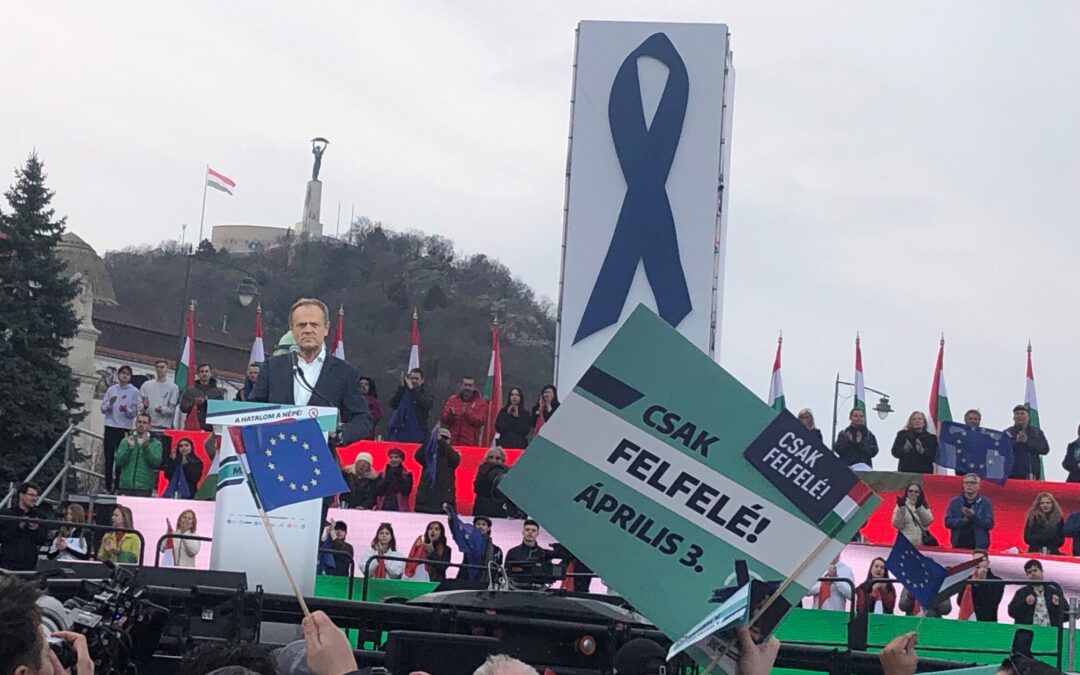Polish opposition leader Donald Tusk spoke today at a rally in Budapest organised by the Hungarian opposition ahead of parliamentary elections in three weeks’ time.
Tusk condemned Hungarian Prime Minister Viktor Orbán’s links to Vladimir Putin and likened the war in Ukraine to the struggle for democracy in Poland and Hungary.
🔵EM's march, featuring Donald Tusk(EPP) pic.twitter.com/8pruUB7bpb
— 🇭🇺Hungary Elects🇪🇺 (@HElects) March 15, 2022
The war against Russia “is not only a fight for Ukraine’s independence”, said Tusk. “The stakes are even higher: it is also a war for our future, for Poland, Hungary and the whole of Europe.”
“That is why these elections, your elections here in Hungary are so important for you, but also for the whole of Europe and for the dreams of Ukrainians,” he continued, quoted by news service 300Polityka.
Orbán has given Hungary a reputation as having the “the most pro-Putin government in Europe”, added Tusk, who as well as being leader of Poland’s Civic Platform (PO) party is also chairman of the European People’s Party (EPP), which Hungary’s ruling Fidesz party was a member of until last year.
O tym, jaka będzie przyszłość Europy!
Posłuchajcie przewodniczącego @donaldtusk👇 pic.twitter.com/Y4TZfrjiUL
— PlatformaObywatelska (@Platforma_org) March 15, 2022
Putin’s vision is “of an authoritarian state with censorship, a corrupt state, a state that professes a cult of power, not the rule of law”, said Tusk. That view is “shared by some European politicians, also unfortunately here in Budapest”.
“Today we must say very loud and clear in Budapest, Warsaw, Paris, Brussels: we do not want Putin in Ukraine, we do not want Putin in Europe,” he declared, quoted by RMF24. “That is why Europe looks to you with such hope: you are the hope of the free world during the key elections in Hungary.”
“Ukrainians must fight for a free, independent, law-abiding, democratic state with weapons in hand; we must fight for our freedom, for our rights, for democracy, for freedom of speech with the ballot paper in hand,” added Tusk.
Thousands of demonstrators and quite a few #Ukraine flags at the opposition rally in Budapest today. Russia's war in Ukraine and PM Orbán's ties to #Putin the main topic of speeches so far. 1 minute of silence held for Ukrainian victims of war. pic.twitter.com/2Vp2V1PWzE
— Justin Spike (@jspikebudapest) March 15, 2022
Earlier in the day, Tusk had met with Péter Márki-Zay, the joint opposition candidate standing against Orbán at the parliamentary elections on 3 April. Tusk expressed hope that the alliance led by Márki-Zay will in future become a political party that can join the EPP.
Following the meeting, the Polish opposition leader also likened the situation in their two countries, saying that their governments have undermined the rule of law, democracy and media freedom. “All this connects the Hungarian opposition and the opposition in Poland,” he said. “We will cooperate.”
Orbán’s Fidesz and Poland’s national-conservative ruling Law and Justice (PiS) party have long enjoyed close links. The two have supported one another in their regular clashes with the European Union.
Over the last year, PiS has also led efforts to forge an alliance between right-wing and far-right leaders in Europe, including Marine Le Pen and Matteo Salvini as well as Orbán.
In December, Tusk described those actions as “treason”, pointing to the pro-Russian positions of such leaders. A few months earlier, he had accused the Polish government of “implementing Putin’s agenda”.
PiS has dismissed such accusations, noting its own strongly anti-Russian position and arguing that its alliance with the likes of Le Pen and Salvini allows it to encourage them to move away from the Kremlin.
It also accuses Tusk and other opposition figures in Poland of enjoying close relations with European leaders who have done much more to help the Kremlin, for example through Germany’s reliance on Russian gas.
Main image credit: Zsuzsanna Szelenyi/Twitter

Daniel Tilles is editor-in-chief of Notes from Poland. He has written on Polish affairs for a wide range of publications, including Foreign Policy, POLITICO Europe, EUobserver and Dziennik Gazeta Prawna.




















